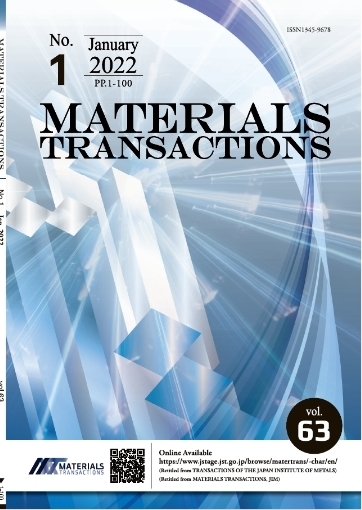Aging of Copper-Titanium Dilute Alloys in Hydrogen Atmosphere: Influence of Prior-Deformation on Strength and Electrical Conductivity
Satoshi Semboshi, Shin-ichi Orimo, Hisashi Suda, Weilin Gao, Akira Sugawara
pp. 2137-2142
Abstract
The influence of prior-deformation on the mechanical and electrical properties of Cu-4.2 mol% Ti alloys aged in a hydrogen pressure of 0.8 MPa was examined. This follows from the results of aging solution-treated Cu-Ti alloys in a hydrogen atmosphere, which significantly improved their electrical conductivity over alloys conventionally aged in vacuum, without degradation of the mechanical strength. The maximum-strength was enhanced in the prior-deformed specimen, and the strengthening and increase in electrical conductivity were accelerated during aging in a hydrogen atmosphere, compared to that for the non-deformed specimen. As a result, the balance between the strength and the conductivity is improved within shorter aging time for specimens that are more severely deformed and then aged in a hydrogen atmosphere. The strengthening is mainly due to age-hardening by the growth of finely dispersed precipitates of Cu4Ti and TiH2, which are preferentially nucleated at lattice defects such as dislocations and nano-sized deformation twins. The improved conductivity is closely related to reduction of the solute Ti concentration in the copper matrix, which is attributed to the precipitation of TiH2 and Cu4Ti. Thus, prior-deformation assists to render a good combination of strength and electrical conductivity for Cu-Ti dilute alloys during aging in a hydrogen atmosphere.
Readers Who Read This Article Also Read
MATERIALS TRANSACTIONS Vol.52(2011), No.12
MATERIALS TRANSACTIONS Vol.52(2011), No.12
MATERIALS TRANSACTIONS Vol.52(2011), No.12










